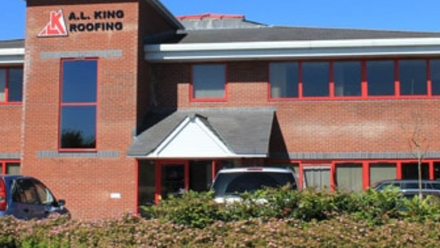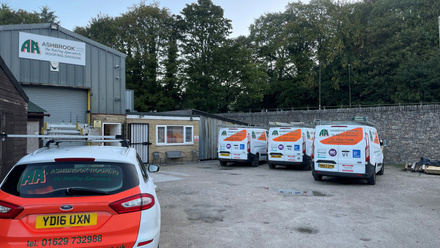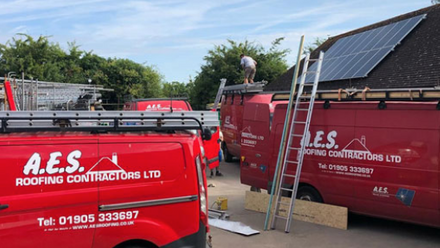You’ve been in roofing a long time, Karl. Can you talk about your experience?
I’m just coming into my 41st year in roofing. I was offered a job the day before my 16th birthday and I’ve never looked back. I fell in love with roofing almost instantly. Although it was sunny back then…doesn’t seem to be that way so much now!
When did you start your own business?
I’ve been running my own business for 25 years. Up to that point I worked for companies in and around Leeds. In 1999 I decided to bite the bullet and set up my own company. I wanted to make sure I had enough knowledge about running a business. A couple of years prior, I’d started to fall out of love with roofing. But I was fortunate enough to be given an opportunity to work in New Zealand and I fell back in love with it again. I would have stayed longer, but I’d already fallen in love with a woman back home. So I returned to Leeds, we got married, had kids and decided to set the business up at the same time. 25 years on we have 3 kids, 44 employees and a successful family business.
44 employees sounds like a lot to handle!
We actually were about double that 10 years ago, but I realised it was impossible to keep on top of quality control with that many contractors out there. Quality is really important to our business. Obviously during Covid we had to put a lot of employees on furlough, which was tough. But since then we’ve found our sweet spot at around 44 employees.
Tell us about your apprentices?
We have 6 apprentices this year. One of them is actually my son, Charlie. We have a close relationship with the apprentices, and I do go into College once in a while to make sure that everything is OK. I put at least 2 apprentices through each year. Some of them stay with us long term, which is really good. Not every apprentice makes it. Roofing really isn’t for everyone. But this lot are all doing fantastically.
And what is it like working with your son?
He’s on the tools while I’m in the office, so we don’t actually work together that often. We have the odd tête-à-tête, shall we say, but he’s a good lad. He wants to take over the business one day which makes us really proud. It’s nice knowing that the 25 years of graft we’ve put into this business will keep on going. We’re working on getting his sister involved, but she’s not interested.
When was the last time you worked on a roof?
Physically working? Last week, i do most of the lead burning for the company. It is good to keep my hand in. I have just put Charlie through the lead course so hopefully he can take over soon. In regard to roofing i will have a day on the tools every now and again just to remind myself i can still do it. Albeit the lads tell me to ‘go back to the office you old timer.’
Tell me about your involvement with NFRC and Competent Person Scheme
At the moment, I’m regional chair of YNE region for NFRC and soon to be board director. I have one more year of my tenure as Chair, which is exciting as there are a few projects I want to finish. I knew about the CPS through my NFRC membership. I’ve been on the regional committee for around 7 years, and we registered as CPS contractors a few years ago.
Why CPS?
It’s a great way of getting through building control without the hassle. It works very well, it’s simplistic and I value the connection with the NFRC.
Do you think it’s important for roofing contractors to be members of NFRC and register with the Competent Person Scheme?
The NFRC is the largest roofing body in the UK. We are trying to deliver a one-stop shop where we are all audited and accredited, with quality and deliverance. Being a part of it demonstrates commitment to excellence in the industry. The biggest value of NFRC membership is the information. News bulletins, community and support. The more involved you get, the more value you receive. The Yorkshire and North East Region has an incredible community, with a Regional Manager who works tirelessly to support the roofing companies in our area. For me the difference between CPS and NFRC is that you have a tool for delivering projects through building control without having the hassle of going through all that rigmarole. Very easy assessment on site, easy set up and lots of assistance with paperwork from the team. I think that it would benefit all NFRC trade members to be CPS registered contractors.
You have lots of other accreditations too. How do you maintain them all?
Accreditations are actually the bane of my life. And one of the reasons I want to stay on as Regional Chair is to fight for some of the causes I believe in, and this is one of them. There are so many accreditations, and clients are now coming to us specifying which accreditation we need to have in order to work with them. For businesses of my size, this is really common. We have a large client base, so within that each client might have a different requirement – CHAS, Construction Line, Considerate Contractor etc. We have to spend huge amounts of time and money obtaining these accreditations, just so I can continue to work with my clients. Roofing contractors everywhere are having the same problem. It’s a minefield. Are you therefore in support of NFRC pushing for the common assessment standard? Yes, in theory. What I think needs to happen is that the Common Assessment Standard needs to be shared by all. It’s not just NFRC pushing it, everyone needs to be on board. We want to improve things for NFRC members and CPS contractors.
What type of clients do you have?
Everything from domestic, schools, councils, fire brigades, NHS, builders of all different sizes, golf clubs! When the crash happened in 2007/2008 I figured that councils would be one of the only places with work. I got in at the right time, and we’ve been doing responsive repair and refurbs for councils ever since. Nowadays we do a lot more new build work but that side of the business is still going strong.
Do you find that those government, council, NHS type projects specifically ask for CPS registered contractors or NFRC membership?
I had a contract request that named the NFRC membership as a requirement, and I wasn’t a member at the time. I’m glad that contract came about, and I became a member. The NFRC changed my outlook. It has enabled me to get more involved in an industry that I care deeply about and want to give back to. Hopefully as Regional Chair and through my membership I am doing that. It’s critical that NFRC keeps growing. Roofing is a dying game. There are more roofing contractors leaving than there are joining the industry. We have figures on that. We know that for every 600 people leaving the industry each year, only 200(ish) are replacing them. The NFRC and the CPS can help with this and it’s an exciting time to be a part of it.
Moving onto building regulations, how aware do you think property owners are of the requirements?
For domestic clients, not many are aware. I think less than 5% of our clients. We often come up against cheaper competition, and when this happens we use it as an opportunity to educate the client. When we explain the building regulation requirements, it’s often the first the client has heard of it. Once we’ve educated a client, they often pass that information on to their friends and family, which is good. But there’s more work to be done. On the other side, larger clients are becoming much more aware of building regulation requirements, and instead of going through LABCs they are putting the work through the Competent Person Scheme. We’ve put full housing estates through the competent person scheme before. Awareness is definitely growing.
When you come up against cheaper competition who don’t mention building regulations to their clients…is that a suggestion that not all roofing contractors are aware of the regulatory requirements?
Yes it is. We went for a job recently that we didn’t get as the client chose a cheaper contractor. We saw the scaffolding going up, and saw some horrendous goings on. They definitely wouldn’t have passed an inspection, and certainly wouldn’t have been able to go through the Competent Person Scheme. I’d say that 5% of our business is putting other people’s work right. It seems small, but it’s a significant amount of money that clients are having to spend, often for a second time, to have shoddy workmanship put right. We have two projects right now where we are completely re-doing someone else’s work. Quite often it’s builders doing the roofing work themselves, but they don’t have the skills. Clients have been mis sold too and it can be painful to watch. Quite often we’ll go and do a report for clients so they can see how bad it is, and hopefully help them to get their money back. I don’t take pleasure in it at all. It’s awful to break that news.
Is this part of where your passion for giving back to the industry comes from?
Yes absolutely. I was fortunate be given a job all those years ago and fall in love with this industry. It wasn’t the greatest apprenticeship. My gaffer was a bully. Luckily I’m not a quitter and I’m glad I stuck with it. Now I’m in a position to be able to give back, support roofers in the region and make sure that NFRC and CPS roofing contractors have a good reputation.
Tell us about some of your stand out jobs in your career. Any you’re especially proud of?
Some of the work I’ve done personally over the year’s is exceptional. Our company has delivered exceptional work. Not all of it, but a lot of it. Where it’s gone wrong, which happens, we’ve put it right and learned some valuable lessons. I have two jobs that stand out to me. One was in New Zealand. I did a brand new Burlington roof. It took 26 weeks to ship it over from Scotland and to the Bay of Islands. Me and a Scottish lad delivered it together. It was pretty good. Very dodgy scaffolding and terrible PPE, but looking out over the bay of islands was magical. It was the 2nd one ever done there, so there was a very big party to celebrate. In the UK we did a job in Northampton. It was a heritage Grade I listed farm. We did a clocktower and outbuildings. The clocktower was made from 100% traditional oak. Down to battens and pegs. I worked on it alone from start to finish. It was really special to me. I have pictures of both of these projects and I look at them every now and then.
Finally…do you have any tips for roofing contractors to get through what is apparently set to be the wettest summer on record?
Forward planning is the key to everything. Whether it’s weather dependent or not. Plan work based on what the weather looks like it should be doing the next week. Communicate with your clients, do what you can and be sensible. There are jobs that can be done regardless of the weather. You can clean gutters, do tile repairs etc in the rain. So having some of these jobs planned in. There was one year where we had absolutely shocking weather, and not one of my employees had a day off. They didn’t need to, because we had responsive work planned where it wasn’t practical to be on site. If you don’t forward plan, expect trouble.



